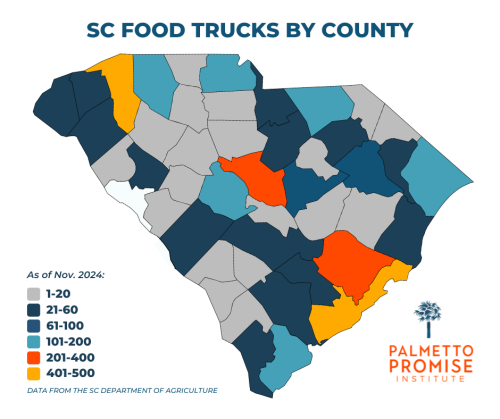The food industry has evolved over the past decade to make room for its newest competitor: the food truck. This innovation has gained a massive audience, with food trucks found in cities of all sizes and many small towns. Entrepreneurs and chiefs have embraced this new culinary adventure as a way of opening their very own business. The only roadblock? The outdated “commissary kitchen” concept.
There are currently 2,894 registered food trucks in South Carolina, according to information provided to us by the SCDA. This number has increased over the years. Take the case of Charleston: in 2022 there were 278 food trucks, but as of this year, the number has increased to 424.

Food Truck Regulations
The food truck industry must adhere to all of South Carolina’s Department of Agriculture’s food and safety regulations as any other food service provider would, but there is a problem. Food trucks face difficulties with the specific regulation that all mobile food businesses must operate out of a commissary kitchen.
The SCDA defines a mobile food establishment as:
“A mobile food establishment consists of a commissary and mobile food unit(s) or mobile food pushcart(s). The food service portion of the operation is conducted from a movable driven or propelled vehicle, portable structure, or watercraft that can change location.”
A commissary kitchen is a food establishment that meets all SCDA standards and can provide support for mobile food establishments in the form of storage, operations, and servicing. For many commissaries, this includes the space for prepping food, receiving shipped inventory, and disposing of waste. Per the SCDA standard, food truck owners are required to return to their commissary every 24-72 hours depending on whether they run a full service or non-self contained unit.
The specific SCDA regulation states:
A full-service (self-contained) mobile food unit must return to the commissary at a frequency necessary to maintain sanitary conditions but in no case may operate for longer than seventy-two (72) hours of operation without returning to the commissary.
Non-self-contained mobile food unit(s) and mobile pushcart(s) must return to the commissary within twenty-four (24) hours of operation.
Levels of Regulations
Food trucks have a long list of permits, protocols, and regulations that they must follow to avoid the government closing the door on their business permanently. These regulations span federal, state, and local ordinances. This is often a headache for new entrepreneurs to navigate all the applications and rules. Below are some of the common hoops food trucks owners need to jump through across federal, state, and local jurisdictions.
On a federal level, all food truck owners must comply with the Federal Motor Carrier Safety Administration (FMCSA) regulations. This includes having a commercial driver’s license to operate and drive the food truck. The FMCSA also set regulations and standards for any motor vehicle transporting food. These outline food storage, cooking equipment, and wastewater disposal procedures.
On a state level, all food truck owners must comply with all health and food safety standards. In South Carolina this is outlined by the South Carolina Department of Agriculture (SCDA) and include the requirement to operate out of a commissary discussed above. Food trucks also have to follow any statewide zoning policies and acquire their food seller’s permit and food handlers permit.
On a local level, all food truck owners must get a business license, public health permit, and mobile food facility permit. Food truck owners might additionally want to consider communicating with the local fire station to ensure compliance with all the fire safety protocols.
What’s the Problem with Commissaries?
The requirement for all mobile food businesses to operate out of a commissary was designed to ensure that food safety regulations are being adhered to and that proper cleaning and waste removal are being followed.









